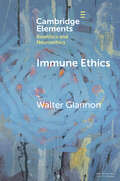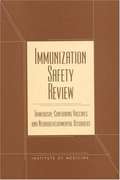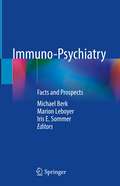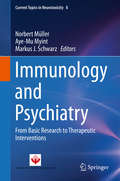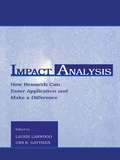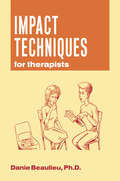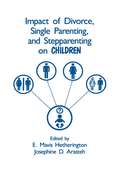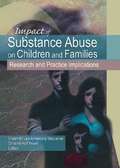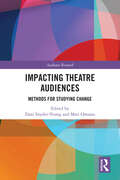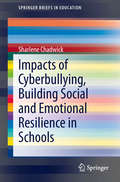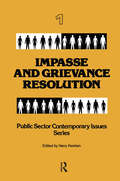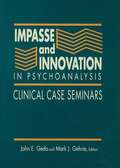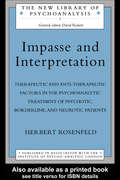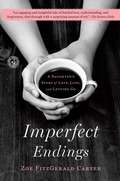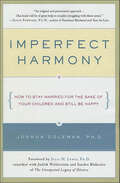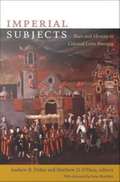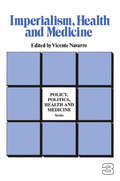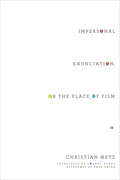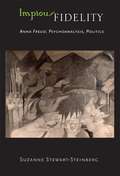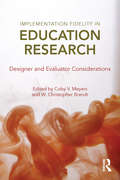- Table View
- List View
Immune Ethics (Elements in Bioethics and Neuroethics)
by Walter GlannonThe immune system maintains homeostasis within human organisms and protects them from pathogenic threats. But sometimes it cannot provide this protection on its own, and vaccines may be necessary to ensure our health and survival. Immune functions can become dysregulated and result in autoimmune disease or multi-system damage. Pharmacological and genomic interventions may activate or modulate immune functions to prevent these outcomes. This Element is an analysis and discussion of some of the ethical implications of these interventions. After describing the main components of innate and adaptive immunity and how it might be enhanced, it considers the potential benefit and harm from vaccines against addiction and viruses, immunotherapy for cancer, neuroimmunomodulating agents to prevent or treat neurodevelopmental and neurodegenerative diseases, and gene editing of immunity to enable xenotransplantation and prevent infectious disease. The Element concludes with an exploration of a possible outcome of natural competition between humans and microbes.
Immunization Safety Review: Thimerosal-containing Vaccines And Neurodevelopmental Disorders
by Institute of MedicienInformation on Thimerosal-containing Vaccines And Neurodevelopmental Disorders
Immuno-Psychiatry: Facts and Prospects
by Michael Berk Marion Leboyer Iris E. SommerThis book presents a thorough and critical review of current knowledge on the role of immunology in major psychiatric disorders and its potential applications. The opening chapters offer general information on the immune influence of the brain to provide readers with a better understanding of the end of immune privilege. The book then examines possible underlying mechanisms leading to psychiatric disorders, from early infections to pro-inflammatory markers, stress, and immune genetic background, linking etiology and psychiatry. The third section describes each disorder (ie autism, schizophrenia, bipolar disorder, depression…) with an overview of underlying immune dysfunctions. Lastly, the authors discuss the innovative immune-therapies that may result from the discovery of immune system biomarkers and their associated mechanisms. A better understanding of the role of the immune system in psychiatric disorders makes it possible to identify stratification biomarkers, to explain underlying mechanisms, and to develop innovative, efficient, targeted treatment strategies and management. As such, the book is of value to clinicians, mental health professionals, mental health researchers, immunologists, industry practitioners, and various stakeholders in the mental health field.
Immunology and Psychiatry
by Norbert Müller Aye-Mu Myint Markus J. SchwarzPsychiatric disorders are one of the most dramatic burdens for humankind. The role of immune dysfunction in the pathophysiology of these disorders has emerged during the last years, because there has been tremendous progress in psychoneuroimmunological research. Many results are presented here by pioneers in the field. The book addresses various effects of the immune system on the pathophysiology and course of psychiatric disorders and highlights the possible future impact on treatment decisions of various psychiatric disorders, including schizophrenia and depression. The contributions cover the role of in utero immune challenges on the development of schizophrenia, the role of infections, and autoimmune diseases and mild immune activation in the development of depression and schizophrenia, the influence of immune responses in other disorders such as Tourette's, Alzheimer's, and OCD, the connections between mental and physical pain as well as between anti-inflammatory and antipsychotic drugs.
Impact Analysis: How Research Can Enter Application and Make A Difference (Applied Social Research Series)
by Urs E. Gattiker Laurie LarwoodThroughout the social sciences, the gap between research and application is a reminder that the goals of scholars and practitioners are not always one and the same. Still, the best scholarship is often acknowledged to be that which informs practice, and the best practice--whether defined in terms of efficiency, flexibility, long-term vision, or even profit--is often that which is based on relevant research. This book presents a discussion among eminent researchers, practitioners, and consultants of the new field of "Impact Analysis." They address three central issues: *the practical ways in which scholars can better ensure that their work has an important influence on practice; *the pros and cons in forging a closer connection between research, consulting, and practice; and *how, despite potential drawbacks, a closer relationship between research and practice can be mutually beneficial. In addition to practical advice, the participants offer predictions that will be of interest to applied researchers in this field and business-oriented professionals.
Impact Techniques for Therapists: 88 Activities To Engage Your Students
by Danie BeaulieuImpact Techniques for Therapists teaches the basic principles of Impact Therapy, first developed by Ed Jacobs in 1992. Drawing heavily on the work of Milton Erickson, this form of therapy uses a creative and interactive approach to counseling that involves all senses in the therapeutic process. These innovative, multisensory techniques will incorporate therapist-client exchanges on not only verbal but also visual and kinesthetic levels, thereby increasing the efficacy of the intervention. Accompanied by a conversational tone and vivid artwork, Beaulieu presents concrete examples of props and movements that can be introduced into therapy and thoroughly illustrates their different uses. Originally written and published in French as a handbook for therapists, Dr. Beaulieu’s formative work is now available in a new English edition, with a more encompassing introduction as well as updated case examples. The model set forth in this book can be integrated easily and seamlessly into the practice of a wide variety of mental health professionals seeking to discover new and innovative developments in brief therapy.
Impact of Divorce, Single Parenting and Stepparenting on Children: A Case Study of Visual Agnosia
by E. Mavis Hetherington Josephine D. ArastehThis book, a result of a conference sponsored by the National Institute of Child Health and Human Development, explores developmental and clinical evidence of how divorce, and the transition to single parenting and stepparenting affects children. Many of the articles collected here look at the legal measures being used to make such transitions easier for families.
Impact of Substance Abuse on Children and Families: Research and Practice Implications
by Christine Fewell HuffHelp children overcome the increasing dangers they face because of their parents&’ addictionsImpact of Substance Abuse on Children and Families addresses the growing concern over children at risk of developing physical and mental health problems because of their parents&’ addictions to alcohol and other drugs (AOD), including a chapter on the troubling increase of methamphetamine abuse by parents. The book&’s contributors examine current research findings from the United States, Australia, Ireland, and Israel to provide much-needed insight into the effects of addiction on family dynamics, parental attachment styles, and family characteristics. The book also looks at the impact of addiction on school-aged children and on mothers in residential treatment with their children, survey assessment instruments and treatment outcomes, and the value of Student Assistance Services for older children.Almost 25 percent of children in the United States live in a household where a parent or other adult is a heavy or binge drinker. More than 10 percent live in family where illicit drugs are used. Children of alcoholics are nearly 10 times more likely to develop an alcohol use disorder as other children, and often develop behavior problems such as depression, anxiety, attention deficit hyperactivity disorder, conduct disorder, and oppositional defiant disorder. Children of illicit drug abusers are more likely than other children to demonstrate immature, impulsive, or irresponsible behavior, to have lower IQ scores, and poorer school attendance. Impact of Substance Abuse on Children and Families focuses on these critical and often ignored aspects of addiction, providing the latest evidence-based qualitative and quantitative research findings, as well as a summary of available literature. Impact of Substance Abuse on Children and Families examines: the impact on children at various developmental stages the role of the family as a treatment resource alcohol problems and marriage parental attachment styles of drug-using fathers family cohesion and adaptability self-in-relations theory family-centered service models the Strengths and Difficulties Questionnaire (SDQ) adolescent substance abuse treatment online treatment optionsImpact of Substance Abuse on Children and Families is an essential resource for both academics and practitioners working in social work, addictions counseling, sociology, psychology, public health, and family and children&’s studies.
Impact-Techniken in der Einzel- und Gruppenpsychotherapie: Multisensorische Methoden - Fallbeispiele aus dem psychotherapeutischen Alltag (Psychotherapie: Praxis)
by Katrin VaderDieses Fallbuch beschreibt Impact-Techniken im Einzel-und Gruppensetting. Die effizienten multisensorischen emotionsaktivierenden Elemente verschiedener Therapieverfahren werden mit Humor eingesetzt, um Patienten nachhaltig auf der emotionalen Ebene zu erreichen. Gearbeitet wird mit allem, was gerade zur Verfügung steht: der Raum, Stühle, Papier, Tassen, Gläser, innere Bilder, Metaphern, Bewegung, Objekte. In diesem Buch ermöglicht Katrin Vader mit vielen verschiedenen Beispielen den Transfer in die eigene Praxis. Stichworte aus den Fallbeispielen: Patient erreicht sein Ziel nicht. Patient stagniert in dem Zustand, in dem er gekommen ist oder an einer bestimmten Stelle in der Therapie. Patient versteht seine Kommunikationsmuster nicht. Patient ist sich seines sekundären Krankheitsgewinnes nicht bewusst. Therapeut kann sich besseren Überblick über die Problembereiche des Patienten verschaffen. Therapeut kann sich besser vom Patienten und dessen Problemen abgrenzen. Über die Autorin: Dipl.-Psych. Katrin Vader ist niedergelassene Psychotherapeutin für Erwachsene (Schwerpunkt Verhaltenstherapie) in eigener Praxis in Jena. Sie wirkt als Lehrpraxisinhaberin, Supervisorin, Selbsterfahrungsleiterin und Dozentin für verschiedene psychotherapeutische Ausbildungsinstitute in Thüringen und Sachsen, auf Kongressen und für psyCultus® Fortbildungen.
Impacting Theatre Audiences: Methods for Studying Change (Audience Research)
by Dani Snyder-Young Matt OmastaThis edited collection explores methods for conducting critical empirical research examining the potential impacts of theatrical events on audience members. Dani Snyder-Young and Matt Omasta present an overview of the burgeoning subfield of audience studies in theatre and performance studies, followed by an introduction to the wide range of ways scholars can study the experiences of spectators. Consisting of chapter length case studies, the book addresses methodologies for examining spectatorship, including qualitative, quantitative, historical/historiographic, arts-based, participatory, and mixed methods approaches. This volume will be of great interest to theatre and performance studies scholars as well as industry professionals working in marketing, audience development and community engagement.
Impacts of Cyberbullying, Building Social and Emotional Resilience in Schools
by Sharlene ChadwickThis volume explores cyberbullying and its impact on young people in schools in detail. It investigates social and emotional resilience and wellbeing in relation to developing protective factors against the impacts of cyberbullying and contains a range of perspectives to deal positively with cyberbullying as well as a summary of international research. Cyberbullying occurs when any means of technology is used to repeatedly and deliberately engage in bullying behaviours with the intent to cause harm to others. Although anyone can be affected, young people who are also being bullied offline are more likely to be the target of cyberbullying. Forms of cyberbullying include: * abusive texts and emails * posting messages or images * imitating and excluding others online * inappropriate image tagging. Cyberbullying differs from face-to-face bullying. * a sense of anonymity for those who bully * can occur 24/7 and is invasive * can have a large audience * difficult to delete comments and images.
Impasse and Grievance Resolution (Public Sector Contemporary Issues)
by Harry KershenPraised by reviewers as a superior book in the field of public sector bargaining, "Impasse and Grievance Resolution" is the classic "how to" text for the resolution of new contract disputes and ongoing contract grievances. Comprehensive, up-to-date, full of good practical advice. "Impasse and Grievance Resolution" is the ideal addition to your own professional library.
Impasse and Innovation in Psychoanalysis: Clinical Case Seminars
by Mark J. Gehrie John E. GedoImpasse and Innovation in Psychoanalysis offers a rare perspective on the technical difficulties and creative responses to them that typify clinical psychoanalysis. The four seminars at the heart of this volume are not case reports in the usual sense. Rather, each seminar revolves around the challenges of translating an understanding of difficult process issues into an effective therapeutic response. What emerges in each case is a vivid picture of an analyst's subjective experience in conceptualizing and managing a particularly demanding treatment, supplemented by data about the patient's history and free associations and enlivened by seminar leader John Gedo's challenging questions and clinical commentary. Each seminar is framed by Mark Gehrie's introduction and commentary, the latter addressing the interplay of theory and technique in the preceding case. Gehrie's commentary is then followed by Gedo's notes, which are keyed to specific points in the seminar transcript. Gedo not only clarifies issues left in doubt by the original discussion but offers his own second thoughts about the clinical material and its technical handling. The uniquely dialogic format of this volume brings different voices to bear on issues at the forefront of the evolution of clinical psychoanalysis. Edifying reading for practicing analysts and analytic therapists, Impasse and Innovation in Psychoanalysis is a wonderful teaching tool, introducing candidates, residents, and students to the demands of coping with stressful transferences and enactments and sparkling, throughout, with Gedo's wit and wisdom.
Impasse and Interpretation: Therapeutic and Anti-Therapeutic Factors in the Psychoanalytic Treatment of Psychotic, Borderline, and Neurotic Patients (The New Library of Psychoanalysis)
by Herbert RosenfeldHerbert Rosenfeld makes a powerful case both for the intelligibility of psychotic symptoms and the potential benefits of their treatment by psychoanalytic means.
Imperatives
by Mikhail Kissine Mark JaryImperative sentences usually occur in speech acts such as orders, requests, and pleas. However, they are also used to give advice, and to grant permission, and are sometimes found in advertisements, good wishes and conditional constructions. Yet, the relationship between the form of imperatives, and the wide range of speech acts in which they occur, remains unclear, as do the ways in which semantic theory should handle imperatives. This book is the first to look systematically at both the data and the theory. The first part discusses data from a large set of languages, including many outside the Indo-European family, and analyses in detail the range of uses to which imperatives are put, paying particular attention to controversial cases. This provides the empirical background for the second part, where the authors offer an accessible, comprehensive and in-depth discussion of the major theoretical accounts of imperative semantics and pragmatics.
Imperfect Endings
by Zoe Fitzgerald CarterZoe Carter's busy life on the West Coast with her husband and daughters takes an unexpected detour when her glamorous, independent-minded mother, Margaret, tired of living with Parkinson's disease, decides she wants to "end things." As Zoe and her sisters negotiate over whether or not they should support Margaret's choice and who should be there at the end, their discussions stir up old alliances and animosities, along with memories of a childhood dominated by their elegant mother and philandering father. Capturing the stresses and the joys of the "sandwich generation" while bringing a provocative new perspective to the assisted suicide debate, Imperfect Endings is the uplifting story of a woman determined to die on her own terms and the family who has to learn to let her go.
Imperfect Harmony: How to Stay Married for the Sake of Your Children and Still Be Happy
by Joshua ColemanDr. Joshua Coleman is a caring psychologist who nonetheless isn't afraid to tell the truth: not all marriages can be joyful at all times, but that isn't a cause for divorce, especially with children involved.Even if your marriage is never going to be the one you dreamed of, you can still live happily ever after. Dr. Coleman provides wise and compassionate advice on becoming a happy person in an unhappy situation.In this groundbreaking work, Dr. Coleman also teaches readers how to:- Reduce out-of-control conflict in the home- Let go of the fairy-tale marriage ideal and create a better reality- Accept change in your partner and make peace with what you can't change- Maintain domestic harmony in times of crisisUnhappy husbands and wives finally have an alternative to the devastation of divorce. And by maintaining imperfect harmony, each parent has the opportunity to love, to care for, and to teach his or her children "full-time."
Imperial Bedlam: Institutions of Madness in Colonial Southwest Nigeria (Medicine and Society #10)
by Jonathan SadowskyThe colonial government of southern Nigeria began to use asylums to confine the allegedly insane in 1906. These asylums were administered by the British but confined Africans. Yet, as even many in the government recognized, insanity is a condition that shows cultural variation. Who decided the inmates were insane and how? This sophisticated historical study pursues these questions as it examines fascinating source material—writings by African patients in these institutions and the reports of officials, doctors, and others—to discuss the meaning of madness in Nigeria, the development of colonial psychiatry, and the connections between them. Jonathan Sadowsky's well-argued, concise study provides important new insights into the designation of madness across cultural and political frontiers.Imperial Bedlam follows the development of insane asylums from their origins in the nineteenth century to innovative treatment programs developed by Nigerian physicians during the transition to independence. Special attention is given to the writings of those considered "lunatics," a perspective relatively neglected in previous studies of psychiatric institutions in Africa and most other parts of the world.Imperial Bedlam shows how contradictions inherent in colonialism were articulated in both asylum policy and psychiatric theory. It argues that the processes of confinement, the labeling of insanity, and the symptoms of those so labeled reflected not only cultural difference but also political divides embedded in the colonial situation. Imperial Bedlam thus emphasizes not only the cultural background to madness but also its political and experiential dimensions.
Imperial Subjects: Race and Identity in Colonial Latin America
by Andrew B. Fisher Matthew D. O'HaraIn colonial Latin America, social identity did not correlate neatly with fixed categories of race and ethnicity. As Imperial Subjects demonstrates, from the early years of Spanish and Portuguese rule, understandings of race and ethnicity were fluid. In this collection, historians offer nuanced interpretations of identity as they investigate how Iberian settlers, African slaves, Native Americans, and their multi-ethnic progeny understood who they were as individuals, as members of various communities, and as imperial subjects. The contributors' explorations of the relationship between colonial ideologies of difference and the identities historical actors presented span the entire colonial period and beyond: from early contact to the legacy of colonial identities in the new republics of the nineteenth century. The volume includes essays on the major colonial centers of Mexico, Peru, and Brazil, as well as the Caribbean basin and the imperial borderlands. Whether analyzing cases in which the Inquisition found that the individuals before it were "legally" Indians and thus exempt from prosecution, or considering late-eighteenth- and early-nineteenth-century petitions for declarations of whiteness that entitled the mixed-race recipients to the legal and social benefits enjoyed by whites, the book's contributors approach the question of identity by examining interactions between imperial subjects and colonial institutions. Colonial mandates, rulings, and legislation worked in conjunction with the exercise and negotiation of power between individual officials and an array of social actors engaged in countless brief interactions. Identities emerged out of the interplay between internalized understandings of self and group association and externalized social norms and categories. Contributors. Karen D. Caplan, R. Douglas Cope, Mariana L. R. Dantas, Mara Elena Daz, Andrew B. Fisher, Jane Mangan, Jeremy Ravi Mumford, Matthew D. O'Hara, Cynthia Radding, Sergio Serulnikov, Irene Silverblatt, David Tavrez, Ann Twinam
Imperialism, Health and Medicine (Policy, Politics, Health and Medicine Series)
by Vicente NavarroIncludes articles which offer an alternative view of the political and economic causes of substandard health care in the underdeveloped societies of the Third World.
Impersonal Enunciation, or the Place of Film (Film and Culture Series)
by Christian MetzChristian Metz is best known for applying Saussurean theories of semiology to film analysis. In the 1970s, he used Sigmund Freud's psychology and Jacques Lacan's mirror theory to explain the popularity of cinema. In this final book, Metz uses the concept of enunciation to articulate how films "speak" and explore where this communication occurs, offering critical direction for theorists who struggle with the phenomena of new media. If a film frame contains another frame, which frame do we emphasize? And should we consider this staging an impersonal act of enunciation? Consulting a range of genres and national trends, Metz builds a novel theory around the placement and subjectivity of screens within screens, which pulls in—and forces him to reassess—his work on authorship, film language, and the position of the spectator. Metz again takes up the linguistic and theoretical work of Benveniste, Genette, Casetti, and Bordwell, drawing surprising conclusions that presage current writings on digital media. Metz's analysis enriches work on cybernetic emergence, self-assembly, self-reference, hypertext, and texts that self-produce in such a way that the human element disappears. A critical introduction by Cormac Deane bolsters the connection between Metz's findings and nascent digital-media theory, emphasizing Metz's keen awareness of the methodological and philosophical concerns we wrestle with today.
Impersonal Passion: Language As Affect
by Denise RileyDenise Riley is renowned as a feminist theorist and a poet and for her remarkable refiguring of familiar but intransigent problems of identity, expression, language, and politics. In Impersonal Passion, she turns to everyday complex emotional and philosophical problems of speaking and listening. Her provocative meditations suggest that while the emotional power of language is impersonal, this impersonality paradoxically constitutes the personal. In nine linked essays, Riley deftly unravels the rhetoric of life's absurdities and urgencies, its comforts and embarrassments, to insist on the forcible affect of language itself. She teases out the emotional complexities of such quotidian matters as what she ironically terms the right to be lonely in the face of the imperative to be social or the guilt associated with feeling as if you're lying when you aren't. Impersonal Passion reinvents questions from linguistics, the philosophy of language, and cultural theory in an illuminating new idiom: the compelling emotion of the language of the everyday.
Impious Fidelity: Anna Freud, Psychoanalysis, Politics
by Suzanne Stewart-SteinbergIn Impious Fidelity, Suzanne Stewart-Steinberg investigates the legacy of Anna Freud at the intersection between psychoanalysis as a mode of thinking and theorizing and its existence as a political entity. Stewart-Steinberg argues that because Anna Freud inherited and guided her father's psychoanalytic project as an institution, analysis of her thought is critical to our understanding of the relationship between the psychoanalytic and the political. This is particularly the case given that many psychoanalysts and historians of psychiatry charge that Anna Freud's emphasis on defending the supremacy of the ego against unconscious drives betrayed her father's work.Are the unconscious and the psychoanalytic project itself at odds with the stable ego deemed necessary to a democratic politics? Hannah Arendt famously (and influentially) argued that they are. But Stewart-Steinberg maintains that Anna Freud's critics (particularly disciples of Melanie Klein) have simplified her thought and misconstrued her legacy. Stewart-Steinberg looks at Anna Freud's work with wartime orphans, seeing that they developed subjectivity not by vertical (through the father) but by lateral, social ties. This led Anna Freud to revise her father's emphasis on Oedipal sexuality and to posit a revision of psychoanalysis that renders it compatible with democratic theory and practice. Stewart-Steinberg gives us an Anna Freud who "betrays" the father even as she protects his legacy and continues his work in a new key.
Implausible Beliefs: In the Bible, Astrology, and UFOs
by Allan MazurWhy do people accept ideas that are contradicted by science or logic? In Implausible Beliefs, Allan Mazur offers a comparative look at the nature of irrational belief systems, their social roots, and their cultural and political impact. He begins by providing standards for judging beliefs implausible and assessing the impact of such belief systems onpolitics and social policy in the US. Mazur describes and defends commonsense criteria for establishing that certain views should not be sustained in the face of present-day understanding. He presents a statistical portrait of implausible beliefs rampant in the US, and who tends to accept them.Mazur applies criteria for implausibility to the Bible, astrology, and visitation to Earth of intelligent beings from other worlds. Pointing out that everyone "knows" the Bible but few actually read it, the author scrolls through the first five books of the text, noting points that undermine the scripture's natural history and moral guidance. Working on the assumption that implausible religious views are fundamentally no different from implausible secular views, he critiques secular beliefs in astrology and UFOs. Mazur concludes the volume with an attempt to explain why most people accept implausibility‘some more than others despite evidence and logic that refute them.Looking to mainstream sociology and psychology, Mazur shows how children are socialized into such beliefs, and how adults are influenced by spouses and friends. Personality is also a factor, sometimes abetted by stressful or lonely life situations. Lucidly written, this is a provocative and informative contribution to social psychology, sociology, religion, political science, and American studies.
Implementation Fidelity in Education Research: Designer and Evaluator Considerations
by Coby Meyers W. Christopher BrandtImplementation science is an important and underrepresented topic in the literature of educational research, despite the fact that it is inextricably tied to education policy and improvement. Implementation fidelity (the degree to which a program or intervention is delivered as planned) is, in particular, a key issue for every program developer and researcher designing, executing, interpreting, or communicating their work. Implementation Fidelity in Education Research provides the first serious developer-evaluator collaborative perspective on the practical considerations of implementation fidelity in program development. Using case studies from Investing in Innovation (i3) fund grants, this book prepares future researchers for the challenges posed by implementation issues both ideologically and in practice. This book will be an excellent resource for anyone interested in education research and evaluation and an excellent supplement to research methods courses.
